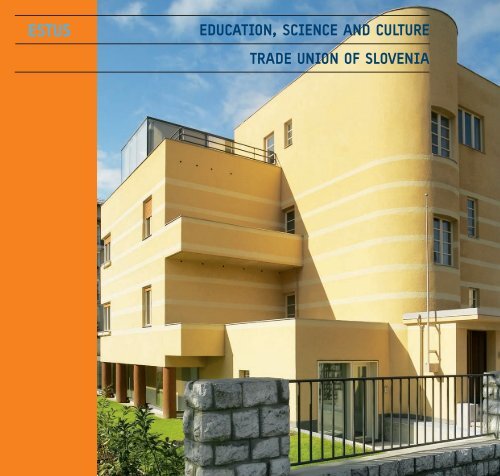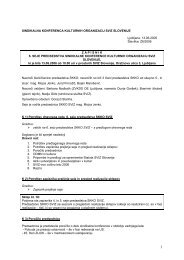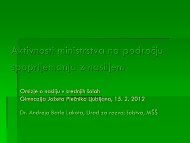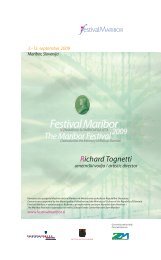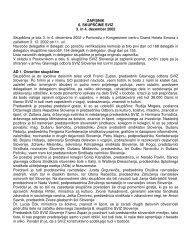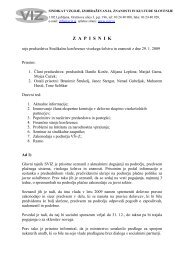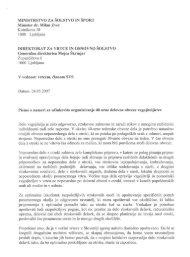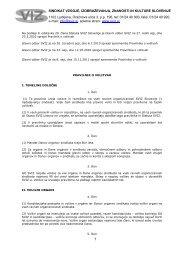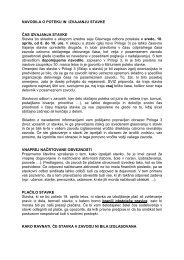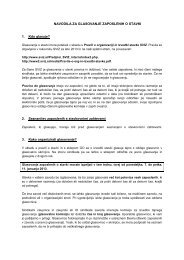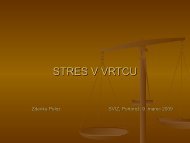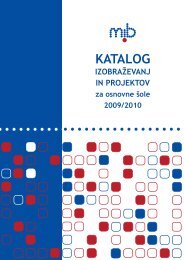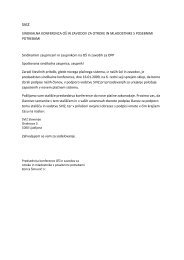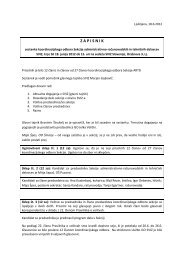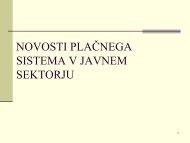education, science and culture trade union of slovenia - SVIZ
education, science and culture trade union of slovenia - SVIZ
education, science and culture trade union of slovenia - SVIZ
Create successful ePaper yourself
Turn your PDF publications into a flip-book with our unique Google optimized e-Paper software.
ESTUSEDUCATION, SCIENCE AND CULTURETRADE UNION OF SLOVENIA
Education, Science <strong>and</strong> Culture Trade Union <strong>of</strong> Slovenia(Sindikat vzgoje, izobraæevanja, znanosti in kultureSlovenije) is the biggest independent <strong>trade</strong> <strong>union</strong> in thepublic sector. The <strong>union</strong> was established in 1990 <strong>and</strong>counts 39.000 members today.At the very beginning <strong>of</strong> its existence ESTUS focused mostlyon the realization <strong>of</strong> the members’ primary needs - salaries,enforcement <strong>of</strong> collective agreements <strong>and</strong> other employeerights. We later shifted our attention more towards legislation- we collaborated with the government, ministries<strong>and</strong> other organizations in order to prepare new legislationfor sectors which we cover. Today, we try hard to dedicate asmuch <strong>of</strong> our time as possible to pr<strong>of</strong>essional issues concerningnot only salaries <strong>and</strong> working conditions but pedagogicalaspect <strong>of</strong> our work as well.The majority <strong>of</strong> our collective rights have been obtainedwith great collaborative effort as we literally went onstrike every single year from 1991 until 1997. The power <strong>of</strong>our <strong>trade</strong> <strong>union</strong> could really be seen between 1998 <strong>and</strong> 2002when it was enough for ESTUS to merely announce a strike<strong>and</strong> have it voted through among its members <strong>and</strong> thedem<strong>and</strong>s for a more appropriate <strong>and</strong> just evaluation <strong>of</strong> theteaching pr<strong>of</strong>ession were brought into effect.
MembersESTUS is one <strong>of</strong> two <strong>trade</strong> <strong>union</strong>s uniting people employed inpre-schools, primary as well as secondary schools <strong>and</strong> thepr<strong>of</strong>essionals employed in the higher <strong>education</strong> <strong>and</strong> <strong>science</strong>sectors (there is another <strong>trade</strong> <strong>union</strong> active in this field). In2001 we also became the representative <strong>trade</strong> <strong>union</strong> forthose who work in the cultural arts sector (artists arebeing represented by one other <strong>trade</strong> <strong>union</strong>).The membership <strong>of</strong> ESTUS is diversified; members come frompre-schools, primary, secondary, music <strong>and</strong> higher <strong>education</strong>schools. We also have members who work in student halls <strong>of</strong>residence, institutions educating children with specialneeds, centres for adult <strong>education</strong> as well as in higher <strong>education</strong>,<strong>science</strong> <strong>and</strong> cultural arts organizations. Our <strong>trade</strong><strong>union</strong> does not only include pedagogues <strong>and</strong> teachers, butalso administrative workers, auxiliary personnel <strong>and</strong> pensioners.ObjectivesESTUS is an independent, democratic <strong>and</strong> non-party organizationuniting the employees in <strong>education</strong>, training, <strong>science</strong><strong>and</strong> <strong>culture</strong> on a voluntary basis in order to:- express <strong>and</strong> implement their interests in an organizedway,- protect their economic <strong>and</strong> social st<strong>and</strong>ing,- protect employee rights,- enforce the role <strong>and</strong> the importance <strong>of</strong> <strong>education</strong> <strong>and</strong><strong>science</strong> as fundaments <strong>of</strong> successful future <strong>of</strong> our country,- influence the shaping <strong>of</strong> policy in <strong>education</strong>, <strong>science</strong> <strong>and</strong><strong>culture</strong>.ESTUS signs <strong>and</strong> supervises the implementation <strong>of</strong>:- the General Collective Agreement on Public Sector,- the Collective Agreement on Education,- the Collective Agreement on Research,- the Collective Agreement on Culture,- <strong>and</strong> brings laws into line with the government in thepreparliamentary procedureThe <strong>trade</strong> <strong>union</strong> strives to ensure the best possible financial<strong>and</strong> social st<strong>and</strong>ing for its members, but its main aim is toachieve an economic situation <strong>of</strong> its members equal to thefinancial situation <strong>of</strong> those employed in other activities.ESTUS endeavours to influence the shaping <strong>of</strong> the policy inupbringing, <strong>education</strong>, <strong>science</strong> <strong>and</strong> <strong>culture</strong> in an organized<strong>and</strong> systematic way.
Due to the increasingly violent behaviour <strong>of</strong> some <strong>of</strong> theyounger students in our primary <strong>and</strong> secondary schools <strong>and</strong>violence against the teachers, ESTUS decided to establish aspecial group to deal with the issue <strong>of</strong> violence <strong>and</strong> thedevelopment <strong>of</strong> effective strategies for its prevention. InMarch 2005 the <strong>union</strong> began with an anonymous telephoneservice where qualified experts <strong>of</strong>fer help <strong>and</strong> advice toanyone employed in schools, or anyone for whom violence atwork is an everyday occurrence.Principles- Mutual solidarity <strong>of</strong> the employees, regardless <strong>of</strong> theirsex, occupation <strong>and</strong> <strong>education</strong> level,- political independence,- quality public <strong>education</strong>,- free schooling at all levels <strong>of</strong> <strong>education</strong>,- social partnership <strong>and</strong> collective agreements,- increase GDP share for <strong>education</strong>, research <strong>and</strong> <strong>culture</strong>,- consistent application <strong>of</strong> the National ResearchProgramme,- adoption <strong>of</strong> the National Culture Programme,- salaries which will be comparable with the social role<strong>of</strong> teachers, researchers, guardians <strong>of</strong> cultural heritage<strong>and</strong> other expert staff,- due evaluation <strong>of</strong> administrative as well as expert <strong>and</strong>technical staff,- double-track strategy - social <strong>and</strong> pr<strong>of</strong>essional partnership,- greater pr<strong>of</strong>essional autonomy <strong>of</strong> teachers, researchworkers <strong>and</strong> those employed in <strong>culture</strong>,- greater influence <strong>of</strong> women in <strong>education</strong>, training, <strong>science</strong><strong>and</strong> <strong>culture</strong>,- permanent pr<strong>of</strong>essional advance training <strong>and</strong> promotion<strong>of</strong> all employees,- better working conditions stimulating high quality <strong>of</strong>teaching <strong>and</strong> research,- care for redundancies.
Major Achievements1991 - The Collective Agreement on Public Sector is signed1992 - The Collective Agreement on Research is signed1993 - The basic ratio for tariff group VII is increased from3.10 to 3.25, base salaries <strong>of</strong> advisory staff are levelledwith those <strong>of</strong> teachers, salaries <strong>of</strong> older teachers withtwo-year university level <strong>education</strong> are also increased(as a result <strong>of</strong> a strike)1994 - System regulation <strong>of</strong> salaries in the public sector (asa result <strong>of</strong> a strike)Overall reduction <strong>of</strong> total working hours by two hours<strong>and</strong> <strong>of</strong> the teaching time by one hourThe Collective Agreement on Education is signed:· First to introduce lump sum indemnity for unlawful dismissal,· First to secure protection for older teachers by reducingthe teaching minimum,· First to achieve accounting <strong>of</strong> the jubilee award on grosssalary,· Bonuses for teaching baccalaureate subjects <strong>and</strong> thosewhich are externally assessed as well as supplementsfor teaching three subjects1995 - Bonus for tutorship qualification- Salary brackets also for those employed in <strong>education</strong><strong>and</strong> training (as a result <strong>of</strong> a strike)- Bonuses for physical activity, for obligatory electionfor titles, for h<strong>and</strong>ling children, youngsters <strong>and</strong> students,for research work, for special strains <strong>and</strong> responsibilities,for management <strong>and</strong> tutorship1997 - advancement into higher salary groups1998 - Agreement is signed between the Government <strong>of</strong> theRepublic <strong>of</strong> Slovenia, University Trade Unions <strong>and</strong> theResearch Institutes on the restructuring <strong>of</strong> the salarysystem to make the salaries <strong>of</strong> university <strong>and</strong> researchinstitute staff comparable to those <strong>of</strong> other top qualifiedpr<strong>of</strong>essions.All university teachers can be elected to the Senate; theacademic assembly is the representative body <strong>of</strong> all universityteachers, researches <strong>and</strong> university associates;lectors become university teachers <strong>and</strong> librariansbecome university associates.1999-2002 - Comparable rise in salaries for all employeesin <strong>education</strong>, <strong>science</strong> <strong>and</strong> <strong>culture</strong>Constitutional dispute resolved in our favour1994 - against compulsory membership in the SocialChamber,- against the legal provision preventing non-pedagogicalstaff to participate in the management in institutionalcouncils.1996 - Permanence <strong>of</strong> pr<strong>of</strong>essional titles <strong>and</strong> easier acquisition<strong>of</strong> titles
HELD STRIKES1991: 16 April, 23, 24, 27 May <strong>and</strong> 10 October1992: 28 October1993: 2 <strong>and</strong> 4 April, 9 through 11 June1995: 31 May1996: 7 May <strong>and</strong> 22 May2005: June 16: a 100 ESTUS representatives participate in aprotest taking place in front <strong>of</strong> the Ministry <strong>of</strong> Health headquarters(1,000 participants all together); November 26 -1,500 representatives participate in the biggest demonstrationSlovenia had ever witnessed - the protest is against theupcoming social <strong>and</strong> economic reforms announced by thegovernment (40,000 participants all together)2006: September 8 - another protest assembly in front <strong>of</strong>the Ministry <strong>of</strong> Labour, Family <strong>and</strong> Social Affairs headquarters(200 ESTUS members, 1,000 participants all together)
ESTUS is also a co-founder <strong>of</strong> Education International (EI)<strong>and</strong> has been its member since 1993. Education Internationalis the federation <strong>of</strong> organizations representing over 29 millionteachers <strong>and</strong> other <strong>education</strong> workers, through 338member organizations in 161 countries <strong>and</strong> territoriesWhen Slovenia joined the EU as a fully authorized memberESTUS is a member <strong>of</strong> state sector <strong>trade</strong> <strong>union</strong>s coordination<strong>and</strong> participates in the following parliamentary committees:Committee <strong>of</strong> Culture, Schooling <strong>and</strong> Sports, Committee forthe Internal Affairs, Public Administration <strong>and</strong> Justice,Committee for Higher Education, Science <strong>and</strong> TechnologicalDevelopment, Committee for Labour, Family, Social Policy <strong>and</strong>the Disabled Committee. ESTUS also participates in thesocioeconomic council operating as a consulting forumrelating to issues <strong>of</strong> economic <strong>and</strong> social policy. The councilhelps in the shaping, implementation <strong>and</strong> modification <strong>of</strong>the Social Agreement. One <strong>of</strong> its responsibilities is also toprepare initiatives, suggestions, recommendations <strong>and</strong>reports for the Government, the National Assembly <strong>and</strong> theNational Council.state on May 1 st 2004, ESTUS became a member <strong>of</strong> the ETUCE(European Trade Union Committee for Education). ETUCE,established in 1975, represents approximately 5,5 millionmembers from 118 teachers’ <strong>union</strong>s in 28 European Union(EU) <strong>and</strong> European Free Trade Association (EFTA) countries.ETUCE is composed <strong>of</strong> national organizations <strong>of</strong> teachers <strong>and</strong>other staff in <strong>education</strong> being member organizations <strong>of</strong>Education International (EI) or the World Confederation <strong>of</strong>Teachers (WCT). It has associated member organizations inthe Central <strong>and</strong> Eastern European countries. The total coveragein Europe amounts to 166 organizations.In the spring 2006 ESTUS established a Confederation <strong>of</strong>Public Sector Trade Unions in cooperation with 4 other publicsector <strong>trade</strong> <strong>union</strong>s. The Confederation represents 81,000members - more than half <strong>of</strong> all the employees <strong>of</strong> the publicsector.
Rights <strong>and</strong> Benefits<strong>of</strong> Members- Legal counselling <strong>and</strong> representation through a network<strong>of</strong> contractual lawyers <strong>and</strong> through permanent legalassistance provided at the headquarters <strong>and</strong> some <strong>of</strong>the regional committees <strong>of</strong> ESTUS,- financial assistance to members in need,- credits <strong>and</strong> subventions for advanced training,- subsidizing <strong>education</strong> for the acquirement <strong>of</strong> suitablequalifications for ESTUS members- cheaper voluntary insurance,- accident insurance,- low-price stays in 33 holiday apartments owned by<strong>SVIZ</strong>: at the seaside in Simonov zaliv, Izola, Lucija,Ankaran <strong>and</strong> Piran; in Kranjska Gora, Bohinjska Bistrica<strong>and</strong> in the spas <strong>of</strong> Dobrna, Ptuj, PodËetrtek, ZreËe,Moravske Toplice, ©marjeπke Toplice, Rogaπka Slatina<strong>and</strong> Banovci,- favourable credits from the Workers’ Savings Bank,- organization <strong>of</strong> different cultural <strong>and</strong> sports activities,- acquirement <strong>of</strong> different benefits for ESTUS members.The membership feeaccounts for 0,6 % <strong>of</strong>gross salary.42 % <strong>of</strong> the membership fee is used by the institute’s <strong>trade</strong><strong>union</strong>, while the other part is allocated to the assurance<strong>of</strong> membership benefits <strong>and</strong> for the smooth operation <strong>of</strong>the regional, national <strong>and</strong> international organizations.Humanitarian Activities<strong>of</strong> ESTUSNot only does ESTUS regularly help its members with financialaid, the <strong>union</strong> had in the past successfully carried outa number <strong>of</strong> humanitarian actions <strong>and</strong> donated funds forthose in dire need <strong>of</strong> help. We intend to pursue this coursein the future as well.So far funds have been donated for the needy Iraqi children,the youth health <strong>and</strong> summer resort in Debeli rtiË, for theconstruction <strong>of</strong> schools <strong>and</strong> the purchase <strong>of</strong> the necessaryequipment for schools in Burkina Faso, for the inhabitants<strong>of</strong> Asia affected by the tsunami <strong>and</strong> the irradiation devicegiven to the Institute <strong>of</strong> Oncology Ljubljana. We called outto all <strong>of</strong> our members <strong>and</strong> tried to collect 1,000 sleepingbags for the victims <strong>of</strong> the devastating earthquake inPakistan. The response was overwhelming. We managed tocollect more than we had set out to. In 2005 we celebratedthe World Teachers’ Day by inviting our members to donateblood; again, the response was unbelievable.
Organizational structure <strong>of</strong>the <strong>union</strong>ESTUS has its <strong>trade</strong> <strong>union</strong> representatives in the majority <strong>of</strong>Slovenian pre-schools <strong>and</strong> schools, numerous faculties,research institutes <strong>and</strong> cultural organizations. These representativesare elected by those employed. A <strong>trade</strong> <strong>union</strong> (ina school, a research institute or a cultural organization)representative is the spokesperson vis-à-vis the schoolmanagement <strong>and</strong> is the first person to establish contactwith the regional committee or secretariat. He or she represents<strong>and</strong> protects the interests <strong>of</strong> the membership. Therepresentative convenes <strong>trade</strong> <strong>union</strong> meetings, participatesin the employees’ rights, obligations <strong>and</strong> responsibilitiesenforcement processes <strong>and</strong> presents the <strong>trade</strong> <strong>union</strong> views.The representatives are trained to advise their colleaguesabout the <strong>trade</strong> <strong>union</strong> work <strong>and</strong> are there to inform themabout the current activities, new developments, futureplans, etc.To ensure that the representatives get a proper training <strong>and</strong>are fully informed about the most recent developments <strong>and</strong>important topics which they need for their work, ESTUSorganizes <strong>education</strong>al seminars throughout the year.Regional CommitteesThe <strong>union</strong> has 28 regional committees which form the linkbetween the members <strong>and</strong> the management <strong>and</strong> secretariat<strong>of</strong> the <strong>union</strong>. Each regional committee autonomously overseesthe implementation <strong>of</strong> collective agreements in itsregion, gives recommendations to the main board regardingthe measures to be undertaken <strong>and</strong> is in charge <strong>of</strong> the execution<strong>of</strong> projects in its region. Regional committees <strong>of</strong>fertheir members solidarity help which is within their financialmeans <strong>and</strong> ensures their right to free legal representation.
The CongressThe congress, the supreme authority <strong>of</strong> the <strong>union</strong>, meetsevery four years to lay down the general political framework<strong>of</strong> the activities <strong>of</strong> the <strong>union</strong>. The congress consists <strong>of</strong>regional delegates - these delegates are elected by themembers, one delegate per 200 members but no more than50 delegates per one regional committee. The congressreceives a report on a <strong>trade</strong> <strong>union</strong>’s activities <strong>and</strong> programmeaims <strong>and</strong> adopts constitution. Delegates elect theSecretary General, the Supervisory Board <strong>and</strong> theCommission for statutory questions <strong>and</strong> complaints.Main BoardThe Main Board is the highest authority between the twocongress meetings <strong>and</strong> is convened when necessary, but atleast two times per year. The Main Board shapes the st<strong>and</strong>points,findings <strong>and</strong> dem<strong>and</strong>s in the areas within its jurisdiction,adopts annual action programme <strong>and</strong> a financialplan, discusses incentives <strong>and</strong> suggestions <strong>of</strong> the executivecommittee, decides upon specific joint activities connectedwith the management <strong>of</strong> economic, financial <strong>and</strong> socialst<strong>and</strong>ing <strong>of</strong> the membership <strong>and</strong> those employed in all activities.The Main Board has got 57 members.Trade Union ConferencesTrade <strong>union</strong> conferences <strong>of</strong>: Pre-school <strong>education</strong>,Elementary, music schools & adult training institutes,Institutes for Education & Training <strong>of</strong> Children with SpecialNeeds, Secondary schools & pupils homes, Higher <strong>education</strong><strong>and</strong> research, Cultural organizations all operate within thescope <strong>of</strong> ESTUS.Executive BoardExecutive Board has seven members, all presidents <strong>of</strong> <strong>trade</strong><strong>union</strong> conferences <strong>and</strong> general secretary. Executive Boardexercises decisions <strong>and</strong> st<strong>and</strong>points <strong>of</strong> the Main Board. Itbrings into line the activities <strong>of</strong> <strong>trade</strong> <strong>union</strong> conferences<strong>and</strong> regional committees, evaluates the realization <strong>of</strong> presetdem<strong>and</strong>s, is in charge <strong>of</strong> <strong>trade</strong> <strong>union</strong>’s financial matters,ensures that the <strong>union</strong>’s policies <strong>and</strong> decisions are alwaysproperly presented to the public
SecretariatThe secretariat assists the general secretary in carryingout the daily tasks. Furthermore, the secretariat <strong>of</strong>fersservices to members <strong>and</strong> regional committees in the form <strong>of</strong>advisory <strong>and</strong> consultancy service. The secretariat, locatedin Ljubljana, employs 10 staff <strong>of</strong>ficers.Members’ notificationMembers are informed by up-to-date online notifications orspecial reports sent to the <strong>trade</strong> <strong>union</strong> representatives whoin turn notify their members. ESTUS also publishes monthlyarticles in the pedagogical journal ©olski razgledi.Design <strong>and</strong> Print: MatFormatTranslation: Sabina ©vajgerPhotography: Matevæ Paternoster, Rafael Marn, Jure »ehNumber <strong>of</strong> copies: 1000September, 2006
Head <strong>of</strong>fice <strong>and</strong>contact information<strong>SVIZ</strong> SlovenijeOraænova ulica 3p. p. 1961000 LjubljanaSlovenijatel.: + 386 (0)1 24 40 900fax: + 386 (0)1 24 40 920www.sviz.siinfo@sviz.si


